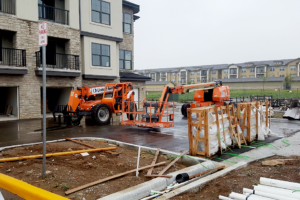Construction is a multifaceted industry that encompasses various types of projects, each with its own unique characteristics and requirements.
From residential buildings to large-scale infrastructure developments, the construction sector plays a vital role in shaping our cities and communities.
To appreciate the industry further, let’s talk about the different types of construction, exploring their methodologies, applications, and significant contributions to the built environment.
Different Categories of Construction Projects
What are the various types of construction projects?
Residential Construction
Residential construction focuses on constructing homes for individuals and families. It includes single-family houses, multi-family buildings, townhouses, and apartment complexes.
In 2022, private residential construction spending demonstrated remarkable growth, reaching a total of $899.1 billion. This notable increase of 13.3% compared to the previous year showcases the robust momentum in the residential construction sector.
This segment involves architectural design, foundation construction, framing, electrical and plumbing installations, and interior finishes.
Meanwhile, energy-efficient and sustainable construction practices are gaining prominence in residential projects, aiming to create environmentally friendly and cost-effective homes.
Commercial Construction
Commercial construction involves the building of structures for commercial and business purposes. This includes office buildings, retail centers, hotels, restaurants, and warehouses.
Commercial construction contributes significantly to economic growth and job creation. In fact, the spending exceeded $96.9 billion in 2020, according to the U.S. Census Bureau.
These projects require careful planning, adhering to local building codes and regulations, and incorporating functional designs to meet the specific needs of businesses and industries.
Industrial Construction
Industrial construction focuses on creating facilities for manufacturing, production, and industrial processes. You may consider factories, power plants, refineries, warehouses, and distribution centers as part of industrial construction.
Industrial construction plays a critical role in supporting industrial activities and economic development. It is characterized by the use of specialized equipment and technologies to meet the unique requirements of industrial operations.
Safety and efficiency should be prioritized in industrial construction, with strict adherence to safety standards and regulations.
Infrastructure Construction
Infrastructure construction involves the development of public works projects that provide essential services and support to communities. This includes transportation systems (roads, bridges, railways, airports), water and wastewater treatment plants, dams, tunnels, and telecommunications networks.
The global infrastructure investment gap is estimated to reach $15 trillion by 2040, highlighting the need for robust infrastructure construction.
These projects require long-term planning, engineering expertise, and coordination among various stakeholders to ensure the smooth functioning of public services.
Heavy Civil Construction
Heavy civil construction focuses on complex and large-scale projects that involve substantial engineering and construction challenges. It includes major infrastructure projects such as highways, bridges, tunnels, dams, and large-scale water and wastewater treatment facilities.
Heavy civil construction demands expertise in project management, environmental considerations, geotechnical engineering, and materials management. These projects often require significant investments and can have a lasting impact on the economy and the environment.
Green Construction
Green construction, also known as sustainable construction or eco-friendly construction, emphasizes environmentally conscious practices throughout the construction process.
It aims to minimize the environmental impact of buildings, reduce energy consumption, and promote resource efficiency. The global green building materials market is projected to reach $419.7 billion by 2027.
Green construction incorporates sustainable materials, energy-efficient designs, renewable energy systems, and waste management strategies to create buildings with reduced carbon footprints.
Renovation and Remodeling
Renovation and remodeling involve modifying or upgrading existing structures to meet changing needs, improve functionality, or enhance aesthetics. It talks about a wide range of projects, including residential homes, commercial spaces, and historical buildings.
Renovation and remodeling play a crucial role in preserving architectural heritage, revitalizing neighborhoods, and adapting structures to modern standards.
Renovation and remodeling projects require careful planning, consideration of structural integrity, adherence to building codes, and collaboration with architects and contractors.
Specialty Construction
Specialty construction talks about projects that require specialized knowledge, skills, and techniques. Examples are stadiums, sports arenas, theaters, museums, theme parks, and healthcare facilities.
These projects often demand architectural innovation, advanced construction methods, and intricate design elements. Specialty construction contributes to cultural enrichment, entertainment, and public enjoyment, while also presenting engineering and logistical challenges.
Importance of Understanding the Types of Construction
Understanding the various types of construction is crucial for several reasons:
Project Planning
Knowing the different types of construction allows project stakeholders, such as clients, architects, and contractors, to plan effectively. They can identify the specific requirements, resources, and expertise needed for each type of project, ensuring proper allocation of time, budget, and manpower.
Specialized Knowledge and Skills
Different types of construction require specialized knowledge, skills, and techniques. By recognizing the specific requirements of each type, professionals can acquire the necessary expertise to deliver successful projects.
Risk Management
Each construction type presents unique risks and challenges. Being aware of these risks allows project teams to develop appropriate risk management strategies, implement safety measures, and allocate resources effectively.
Cost Estimation and Budgeting
The cost of construction can vary significantly, depending on the type of project. By understanding the different construction types, stakeholders can make more accurate cost estimates and budget allocations. This helps prevent cost overruns, ensures proper financial planning, and allows for efficient resource management.
Efficient Resource Allocation
By recognizing the requirements of each type, project teams can allocate resources effectively, streamline procurement processes, and optimize project timelines. This helps avoid unnecessary delays, reduce waste, and enhance overall project efficiency.
The construction industry is a dynamic and diverse field with various types of projects that shape the built environment. As the world continues to evolve, construction practices are adapting to incorporate sustainability, energy efficiency, and advanced technologies.
We’re a full-service construction contractor from Missouri. We have job sites in Kansas, Blue Springs, and Oak Grove. We specialize in house and commercial construction. We’re also the company to call when you need some structural repair done. Our project management team has years of experience between them. You’re assured of having the best people for the job. You can call us at (816) 433-8939. You can also reach us here.



